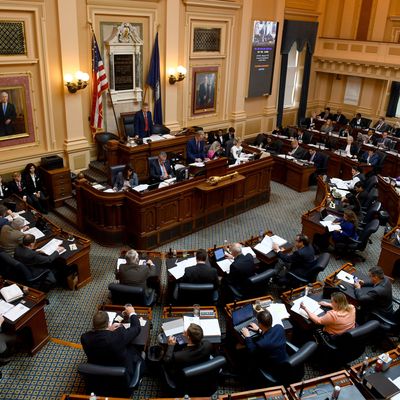
There is so much going on in the run-up to the 2020 elections that you can sympathize with those who feel their particular needs are being ignored by their party — or more to the point, their party’s donors. This is the subtext of a Politico piece giving Republicans focused on 2020 state legislative battlegrounds the opportunity to whine and rattle their cups as they explain how outgunned they feel compared to their Democratic foes. They do have the very valid point to make that this isn’t just any old state legislative election cycle: it’s the one immediately preceding the next decennial round of congressional and state legislative redistricting. So the outcomes are a pretty big deal, at least in those states where legislatures retain control over redistricting (as opposed to those where independent commissions are in charge of the map-drawing — four for congressional districts and six for state legislative districts).
Senior Republicans concede they’re at risk of losing dozens of state-level elections that will determine who wields power over the post-2020 congressional map — and potentially which party controls the chamber for the following 10 years. While Republicans are establishing a massive national infrastructure devoted to reelecting President Donald Trump and winning congressional majorities, party officials say the state legislative races are being overlooked.
The trepidation comes as an array of well-funded Democratic groups — including one with the backing of former President Barack Obama and ex-Attorney General Eric Holder — are flooding cash into Virginia, a key redistricting battleground that’s holding state legislative elections this fall.
Democrats are expected to plow tens of millions into races next year.
“This is as serious as a heart attack and we’ve got to do everything we can to win it because this isn’t about one cycle. It’s about the next decade. And our success nationally as a party is going to depend on our success in these states this cycle,” said Republican State Leadership Committee President Austin Chambers. He acknowledged that his party is less focused on statehouse contests than Democrats are.
It’s true the off-year Virginia elections, in which Republicans are defending slender margins in both chambers, are the kind of events where concentrated resources can make a difference — and occur at a time when there are fewer competing demands on party coffers. But 2020 is another thing altogether. One of the corollaries of a steady trend toward straight-ticket voting is that down-ballot races in presidential election years are heavily affected by presidential results. In 2015, data hound David Byler (then with RealClearPolitics, now with the Washington Post) took a long look at this phenomenon, and concluded there was only so much the parties could do to decouple state legislative from presidential outcomes:
Democratic Party leaders will almost certainly put increased money and manpower into these elections in 2016, but funding, advertising and campaigning on the local level can only do so much. The national political atmosphere will play an outsized role in determining the outcome of state legislative contests. Specifically, the outcome of the presidential race will likely shape the composition of state legislatures across the country.
That indeed seemed to be the case in 2016, an election where (famously, and for the first time ever) straight-ticket voting meant that no state went one way in the presidential election and another in a Senate selection. Flips in control of state legislative chambers followed presidential trends, per this summary from Ballotpedia:
Republicans gained majorities in the Iowa State Senate, Kentucky House of Representatives, and Minnesota State Senate. The GOP gained two additional trifectas as a result of Iowa and Kentucky. Democrats were able to flip the Nevada State Senate, Nevada State Assembly, and New Mexico House of Representatives. As a result, a Republican trifecta was broken in Nevada.
Given the apocalyptic environment surrounding the 2020 presidential race, with both parties focused on base mobilization driven by love or hatred of Donald Trump dominating every conversation, the odds of the straight-ticket trend abating are very low. Like the fights over control of Congress, the future of the Supreme Court, and a host of policy issues, state legislative results will be controlled less by the “investments” Republicans are hoping for than by arguably the highest-stakes presidential contest in at least a generation or two. The people quoted by Politico are constantly contrasting the partisan focus on state legislatures heading toward 2020 with that ten years ago, when Republicans spent a lot of money and made massive gains:
The GOP’s redistricting troubles represent a complete turnabout for the party. In the run-up to the 2010 election, Chambers’ group outspent its Democratic counterpart nearly 3-to-1, helping Republicans net nearly 700 seats and flip control of 20 legislative bodies.
That election, of course, was a midterm, which has very different dynamics than a presidential election. Even then, though, national trends — a very visible and universal backlash to Democratic landslides in 2006 and 2008, and to the newly elected president — almost certainly had more to do with Republican state legislative gains than “targeting” or “resources” devoted to that task. Sure, at the margins, such efforts mattered and always will. But let’s not get carried away with the illusion that down-ballot races are going to follow an independent trajectory from the obsessive cage match of Trump versus Somebody.
If you look at the 2020 target states for the National Democratic Redistricting Committee — the Obama–Holder group that Republicans have been pointing to as potentially eating their lunch — it’s clear the real players in this game understand what’s likely to happen. All nine of them (Florida, Georgia, Minnesota, New Hampshire, North Carolina, Ohio, Texas, Pennsylvania, and Wisconsin) are definite or potential presidential battleground states. If the Democratic presidential nominee does very well next year, so will the NDRC. And if that means Republicans will go into the 2021 redistricting process with diminished hopes, it’s just another price they’ve paid for slavish loyalty to Donald J. Trump.






























